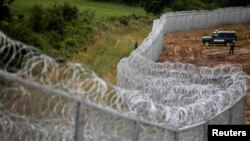Rights groups are increasingly alarmed at what they say is a pattern of systematic violent abuse of refugees by Bulgarian police and have documented dozens of alleged cases in which asylum-seekers traveling through Bulgaria have been beaten and robbed.
It isn’t difficult to find refugees who have traveled through Bulgaria to narrate stories of alleged police abuse. In the Serbian border town of Dimitrovgrad and in what Belgrade residents are calling Afghan Park, it is harder to find asylum-seekers who say they haven't endured abusive treatment in Bulgaria.
Bismillah,16, fled Afghanistan because the Taliban was insisting he enlist. He says Bulgarian police beat him and his two teenage friends, stole all their money — about 200 euros — along with their food, water and cell phones, and set guard dogs on them.
Another teenage boy from a different refugee group showed me a wound on his arm he says was from a police dog.
It isn’t the busiest border in the Balkans for tens of thousands of asylum-seekers passing through on their way to Germany and other northern European countries. One of the reasons rests with these stories of alleged abuse being passed on to other would-be asylum-seekers.
So far, Bulgarian officials have not commented on the allegations.
Documenting Abuses
For weeks now, refugees making it through Bulgaria to Serbia have alleged they suffered beatings and pistol-whippings by police. As a result, many refugees have been forced by Bulgarian police to cross the border back into Turkey, says Nikolina Milic of the Belgrade Center for Human Rights, a partner of the United Nations' human rights agency.
And many of those who do get through claim they endured beatings by Bulgarian police in detention centers or as they walked through the country on their way into Serbia.
“I have documented 30 cases of ill-treatment but those were [each] groups - you know, one group of 10 people," Milic said. "I consider it one case because they all told me the same story.”
She says refugees are nervous about filing formal complaints because they are scared about interacting with the Serbian police — who, they fear, may behave as roughly with them as their Bulgarian counterparts.
Most of the cases documented by the Belgrade Center involve Afghan refugees.
“There is a pattern, because for the past five months we have been receiving the same, more or less the same stories about ill-treatment," said Nikolina Milic. "Allegedly, the police release the police dogs on them. As they told us, police would rob them, take their valuables, take their food and water, and later [they] told about abuses in asylum camps.”
The cases include an Afghan refugee from Kandahar who says he was pistol-whipped after being arrested for not having documents, and a group of refugees who report being fired on as they dashed toward a nearby woods. Two of the latter were wounded.
Other refugees complain of being denied food and water for three days in a Bulgarian detention center.
Several rights groups and charities, including Britain’s Oxfam, are demanding an investigation by European Union authorities.




